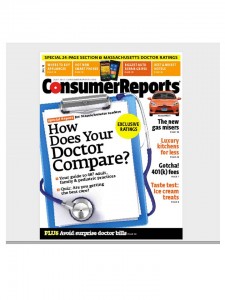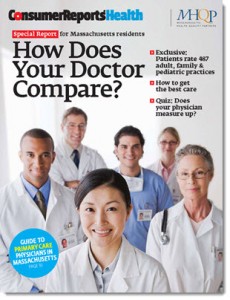 There’s a long-held belief among us long-time health industry analysts that Americans spend more time shopping around for cars and washing machines than for health plans and doctors. Consumer Reports is betting that’s going to change, now that Consumers Union has decided to lend its valuable, trusted brand to developing report cards on physicians, having already rated hospitals and heart surgeons.
There’s a long-held belief among us long-time health industry analysts that Americans spend more time shopping around for cars and washing machines than for health plans and doctors. Consumer Reports is betting that’s going to change, now that Consumers Union has decided to lend its valuable, trusted brand to developing report cards on physicians, having already rated hospitals and heart surgeons.
CR will call their version of the doctor’s report card Patient Experience Ratings. CR has first entered the competitive medical market of Massachusetts, and has unveiled reports on 500 primary care physicians in the state. CR worked with physician survey data from Massachusetts Health Quality Partners (MHQP), a health care coalition of industry stakeholders looking to improve health care in Mass.
The Massachusetts project was funded The Robert Wood Johnson Foundation’s program, Aligning Forces for Quality. As Consumer Reports expands physician ratings throughout the U.S., the organization will work with other state coalitions who survey patient satisfaction with their doctors. Minnesota and Wisconsin are planned for later this year.
 Health Populi’s Hot Points: Welcome to the wonderful world of transparency in health care, driven by several factors: growth in high deductible health plans and other consumer-directed health programs that put more of peoples’ financial skin in the game; expected Health Insurance Exchanges in 2014, which will be marketplaces where consumers can research, compare and select health plans; and, a growing trend of people looking online for ratings on all sorts of consumer goods and services. Think: Angie’s List and Zagat meet health care.
Health Populi’s Hot Points: Welcome to the wonderful world of transparency in health care, driven by several factors: growth in high deductible health plans and other consumer-directed health programs that put more of peoples’ financial skin in the game; expected Health Insurance Exchanges in 2014, which will be marketplaces where consumers can research, compare and select health plans; and, a growing trend of people looking online for ratings on all sorts of consumer goods and services. Think: Angie’s List and Zagat meet health care.
Of course, both of these opinion purveyors have put their toes into these waters. Consumer Reports joins a long list of media, channels and portals providing assessments of doctors. A pioneer in the space was HealthGrades, which has developed and marketed doctor reviews to consumers since 1999 and claims to serve over 100 million people a year as stated in the website’s FAQs.
Earlier this year, Castlight Health LLC attracted $100mm of venture funding to provide “a health care shopping breakthrough,” as touted on their website. The company’s site enables consumers to compare prices of services, such as routine appendicitis that can range from a low of $1,529 to nearly $183,000 in California, according to a study done by Dr. Renee Hsia and colleagues at the University of California-San Francisco whose title begs the question, Health Care as a Market Good?
Notwithstanding the wondrous Paul Krugman of the New York Times, who doesn’t believe the answer to that question is “yes,” U.S. health citizens are faced with growing deductibles, coinsurance amounts, co-payments at the point of purchase and greater sharing in health premiums. So for Americans, health care certainly “feels” like a consumer good — albeit, an increasingly expensive one, competing with other household budget priorities like food, gas, cars, and washing machines. The start-ups and incumbents working to build out an infrastructure for moving health data on quality and prices for a more transparent health care market will be welcomed as long as people will be paying for health services and products out-of-pocket. And the forecast for this is…a very long time.




 I'm in amazing company here with other #digitalhealth innovators, thinkers and doers. Thank you to Cristian Cortez Fernandez and Zallud for this recognition; I'm grateful.
I'm in amazing company here with other #digitalhealth innovators, thinkers and doers. Thank you to Cristian Cortez Fernandez and Zallud for this recognition; I'm grateful. Jane was named as a member of the AHIP 2024 Advisory Board, joining some valued colleagues to prepare for the challenges and opportunities facing health plans, systems, and other industry stakeholders.
Jane was named as a member of the AHIP 2024 Advisory Board, joining some valued colleagues to prepare for the challenges and opportunities facing health plans, systems, and other industry stakeholders.  Join Jane at AHIP's annual meeting in Las Vegas: I'll be speaking, moderating a panel, and providing thought leadership on health consumers and bolstering equity, empowerment, and self-care.
Join Jane at AHIP's annual meeting in Las Vegas: I'll be speaking, moderating a panel, and providing thought leadership on health consumers and bolstering equity, empowerment, and self-care.